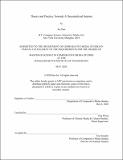| dc.contributor.advisor | Jing Wang. | en_US |
| dc.contributor.author | Su, Han,S. M.Massachusetts Institute of Technology. | en_US |
| dc.contributor.other | Massachusetts Institute of Technology. Department of Comparative Media Studies. | en_US |
| dc.date.accessioned | 2020-09-15T22:04:52Z | |
| dc.date.available | 2020-09-15T22:04:52Z | |
| dc.date.copyright | 2020 | en_US |
| dc.date.issued | 2020 | en_US |
| dc.identifier.uri | https://hdl.handle.net/1721.1/127582 | |
| dc.description | Thesis: S.M. in Comparative Media Studies, Massachusetts Institute of Technology, Department of Comparative Media Studies/Writing, May, 2020 | en_US |
| dc.description | Cataloged from the official PDF of thesis. | en_US |
| dc.description | Includes bibliographical references (pages 77-83). | en_US |
| dc.description.abstract | Why is it the case that Web 2.0 ideals have been reestablished and taken over by centralized apps? What is the root cause behind privacy breaches, data ownership problems, and surveillance capitalism? It is the lack of data interoperability on today's Internet that has led to the deprivation of netizen participation and representation in the data economy. What methodology could we use to analyze these problems? What new paradigms of online interactions and technological developments are changing the status quo and moving the Internet toward a decentralized web? This thesis scrutinizes the evolution of Internet technologies, the changing paradigms of netizens' online interactions, and the socioeconomic structures of Internet platforms in the larger context of the proposed shift from a centralized web to a decentralized one. I propose a three capital model as the fundamental framework to help analyze problems faced by today's Internet. I illustrate the emerging social video and social e-commerce platforms' production paradigms that have won them the comparative advantages against big platforms. I argue that data interoperability is the key to change the siloed app ecosystem toward a more decentralized direction. The third chapter examines the different attempts made by the industry to increase interoperability at different levels--software level, platform level, and infrastructure level. If Web 1.0 granted netizens the right to view online content, and Web 2.0 has given netizens the right to publish in a participatory manner, I envision that Web 3.0 will enable netizens to access personal storage and computation. I propose a breakthrough test and show how projects like SoLid can help to realize data interoperability, and how new ?? technological and marketing infrastructures can recuperate netizens' right for data ownership and representation in the data economy and online content market. | en_US |
| dc.description.statementofresponsibility | by Su, Han. | en_US |
| dc.format.extent | 83 pages | en_US |
| dc.language.iso | eng | en_US |
| dc.publisher | Massachusetts Institute of Technology | en_US |
| dc.rights | MIT theses may be protected by copyright. Please reuse MIT thesis content according to the MIT Libraries Permissions Policy, which is available through the URL provided. | en_US |
| dc.rights.uri | http://dspace.mit.edu/handle/1721.1/7582 | en_US |
| dc.subject | Comparative Media Studies. | en_US |
| dc.title | Theory and practice towards a decentralized internet | en_US |
| dc.type | Thesis | en_US |
| dc.description.degree | S.M. in Comparative Media Studies | en_US |
| dc.contributor.department | Massachusetts Institute of Technology. Program in Comparative Media Studies/Writing | |
| dc.identifier.oclc | 1193321644 | en_US |
| dc.description.collection | S.M.inComparativeMediaStudies Massachusetts Institute of Technology, Department of Comparative Media Studies/Writing | en_US |
| dspace.imported | 2020-09-15T22:04:51Z | en_US |
| mit.thesis.degree | Master | en_US |
| mit.thesis.department | CMS | en_US |
